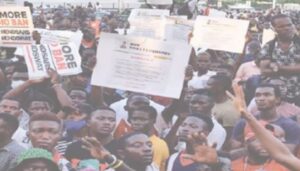Ohanaeze Explains Why Igbo Youths Will Not Join Hunger Protests
Ohanaeze Explains Why Igbo Youths Will Not Join Hunger Protests

The Ohanaeze Ndigbo Youth Wing, a leading Igbo socio-cultural organization, has clarified why Igbo youths will not be participating in the upcoming nationwide hunger protests scheduled from August 1 to 10, 2024.
In a press briefing in Enugu following an Emergency Convention of Igbo Youth Leaders and Stakeholders 2024, titled “State of the Nation,” Ohanaeze outlined several pressing issues in the South East region, including severe economic difficulties, high youth unemployment, and inadequate political representation. Despite these challenges, the acting National President, Chukwuma Okpalaezeukwu, stated that Igbo youths have decided to follow their elders’ recommendation to avoid the protests. Instead, they will seek constructive dialogue with the government to address these specific regional issues.
The decision comes after extensive consultations with youths across the region, who prefer to engage in discussions with both the Federal Government and South East governors to find effective and lasting solutions. Ohanaeze believes this approach will lead to more meaningful and sustainable outcomes rather than resorting to confrontation.
Okpalaezeukwu expressed concerns that the hunger protests, while justified and within constitutional rights, could potentially lead to violence and destruction similar to the 2020 EndSARS protests. He highlighted the risks of further harm to Igbo lives and properties, emphasizing the need for dialogue to avoid repeating past mistakes.
“We need to ensure that our voice is heard through meaningful dialogue,” Okpalaezeukwu said. “We advocate for equity, fairness, and representation in political positions for Igbo youths to be actively involved in governance.”
He also pointed out the threats faced by Igbo businesses and their assets in major cities, stressing the importance of avoiding any destruction. Ohanaeze is calling for appointments of Igbo youths into political roles and hopes that continued dialogue will address the concerns of the South East region, building on the progress made since the end of the civil war.
TRENDING SONGS
 Shock in Anambra: Bride Disappears Moments Before Wedding
Shock in Anambra: Bride Disappears Moments Before Wedding
 Nigerian Woman Returns ₦330 Million Accidentally Credited to Her Account
Nigerian Woman Returns ₦330 Million Accidentally Credited to Her Account
 APC Don Reach Morocco?’ VeryDarkMan Reacts to Seyi Tinubu Poster
APC Don Reach Morocco?’ VeryDarkMan Reacts to Seyi Tinubu Poster
 Bride Breaks Down in Tears as Wedding Meals Were Kept Secretly While Guests Go Home Hungry
Bride Breaks Down in Tears as Wedding Meals Were Kept Secretly While Guests Go Home Hungry
 Odogwu by Day, Robber by Night: How Marriage Joy Turned Into Tragedy
Odogwu by Day, Robber by Night: How Marriage Joy Turned Into Tragedy
 Nigerian Officials Allegedly Pocket N4–6B Weekly Through Smuggling Cartels at Seme–Badagry Border
Nigerian Officials Allegedly Pocket N4–6B Weekly Through Smuggling Cartels at Seme–Badagry Border
 Ahmad Yerima: Naval Officer to Face No Sanctions After Clash with Wike – Matawalle
Ahmad Yerima: Naval Officer to Face No Sanctions After Clash with Wike – Matawalle
 Trending Video: Muslim Man Joins Wife in Hallelujah Challenge ‘Dress Like Your Miracle’ Night
Trending Video: Muslim Man Joins Wife in Hallelujah Challenge ‘Dress Like Your Miracle’ Night
 Woman Seeks Advice as Late Brother’s Wife Refuses to Mourn Him Following His Death With Alleged Mistress
Woman Seeks Advice as Late Brother’s Wife Refuses to Mourn Him Following His Death With Alleged Mistress
 Nobody Cares About Fine Girls In The UK, I Miss Nigeria — Nigerian Lady Laments
Nobody Cares About Fine Girls In The UK, I Miss Nigeria — Nigerian Lady Laments
Share this post with your friends on ![]()













